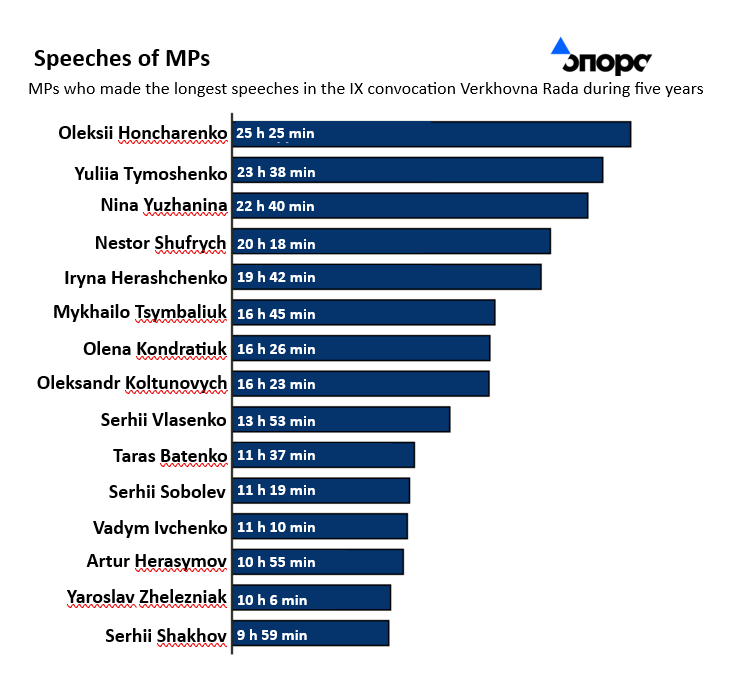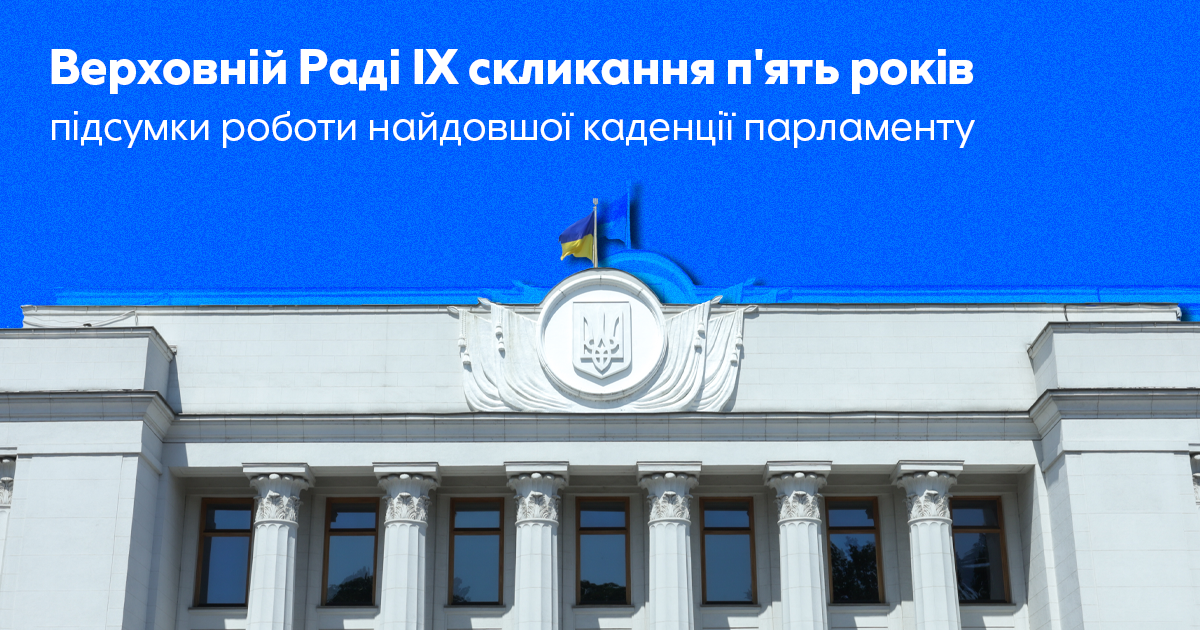August 29, 2024, was the fifth anniversary of the IX convocation Verkhovna Rada work. For more than two and a half of those years, it has been functioning in the conditions of the full-scale Russian invasion. This convocation of the parliament has already been working for 1828 days, and due to the martial law, it will definitely become the longest one in Ukrainian history.
In 2019, the parliament was actively discussed in the public space: there were talks about Truskavets (the MPs’ school) and the "turbo mode" (accelerated adoption of important initiatives), people were marveled at the mono-majority of the Servant of the People party and predicted how it would affect the legislative process in Ukraine. However, over time, the Verkhovna Rada has been increasingly becoming a shadow of the President’s Office, and public attention towards it has been declining.
And yet, MPs continue to work, vote, and pass bills. The work of the country's main legislative body at the beginning of Russia's full-scale invasion did not allow Kremlin propagandists to claim about "chaos" and "paralysis" of the authorities in Ukraine.
Despite the reduction in the number of current MPs to a record low of 401 and a slight decline in the overall average attendance rate to 60%, the Verkhovna Rada is intensively adopting bills. In particular, after February 24, 2022, the share of adopted initiatives in the field of security and defense increased significantly to 11% (previously it was 4.5%).
At the same time, opinion polls show that trust in the parliament is rapidly declining. 29% of Ukrainians said they "completely" or "rather" trusted the parliament, although in 2022 this figure was 56%. It is not known when and under what conditions parliamentary elections will be held (and whether it is appropriate to use the word "elections" in times of war), but there is a public demand for a democratic Ukrainian parliament.
Therefore, in this material, the OPORA Civil Network will not be talking about elections, intrigues or scandals related to the Verkhovna Rada of the IX convocation, but will summarize 5 years of its work.
It should be noted that the Verkhovna Rada of Ukraine does not publish some of the open data about the work of MPs. This could affect the accuracy of the study.
Loyalty to President's initiatives is the highest
During the five years of the IX convocation’s work, 7,269 bills were registered in the Parliament. In particular, 1,000 initiatives were introduced over the past year.
MPs registered the largest number of bills – 5,996 (82%). The Cabinet of Ministers came in second with 983 initiatives (14%), followed by the President with 290 (4%).
The President's legislative activity proved to be the most successful, as his initiatives were the ones most supported by MPs. This trend is characteristic of many convocations of the Verkhovna Rada and demonstrates the significant influence of the guarantor of the Constitution on the legislation of Ukraine. Thus, the support for the President's bills is almost 76%, for the government's bills – 32%, and for the MPs' bills – only 15%.
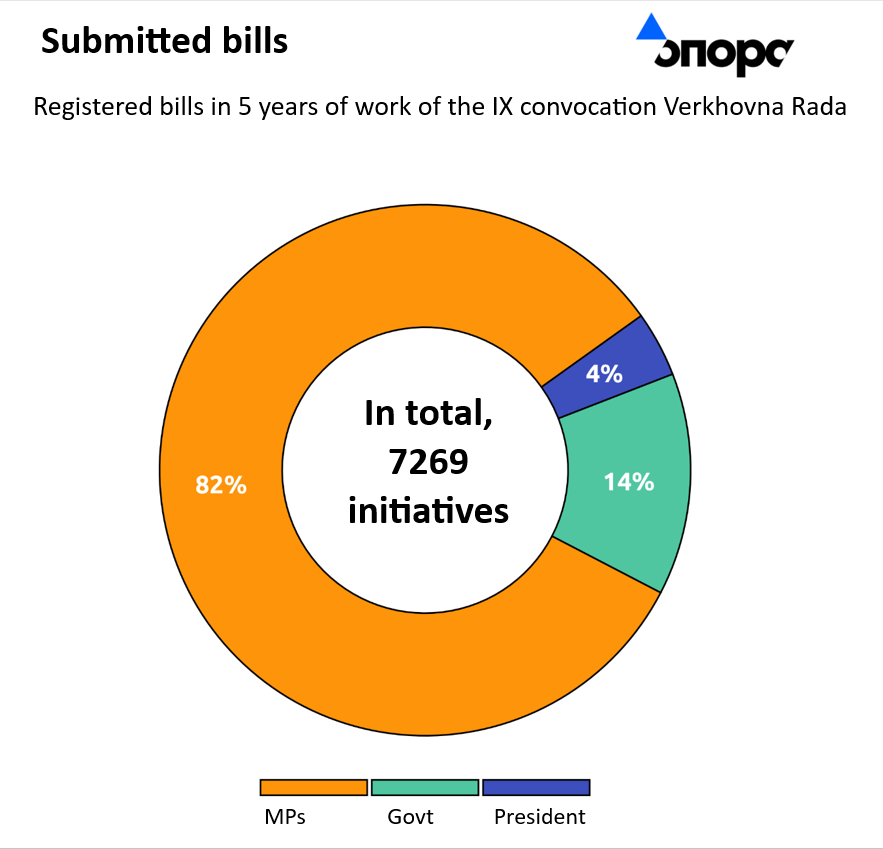
In total, 221 out of 290 draft laws initiated by the President successfully passed voting, as well as 320 out of 983 government initiatives, and 880 out of 5996 MPs' initiatives. It is worth noting that more than half of the adopted presidential initiatives concerned international agreements. At the same time, despite the success of the President's initiatives, MPs remain the main "donor" of adopted laws – 62% of the total number.
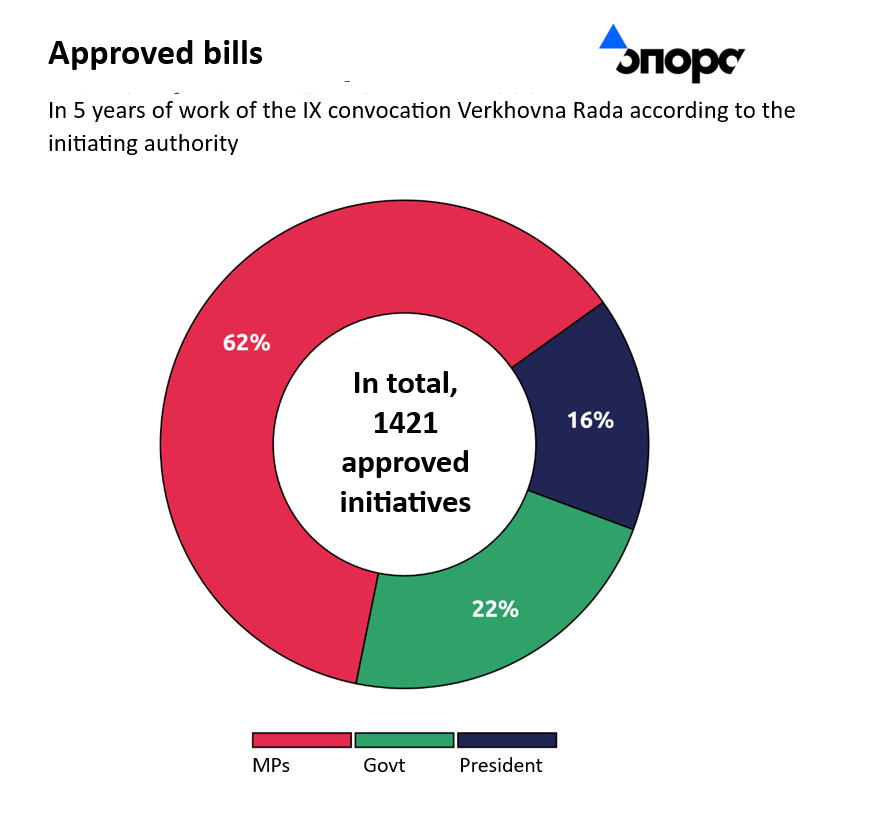
You can read more about Volodymyr Zelenskyi's legislative work in OPORA's material "5 Years Since Inauguration: What President Zelenskyi Promised and How He Worked".
Every fifth initiative comes into force
Over the five years of the Rada's work, every fifth draft law initiative successfully passed voting – 1421 out of 7269 registered. In the previous convocation, this figure was lower, as the Parliament supported only one out of eight draft laws. It is noteworthy that, compared to the previous OPORA's results (for the four years of the Parliament's work), the efficiency of the MPs of the IX convocation has not changed.
It is also worth noting that in terms of the percentage of bills passed, the current parliament is twice as far ahead as the parliament of the VII convocation (2012-2014) and is generally comparable to the Verkhovna Rada of the VI convocation (2007-2012). The most successful parliament in the history of the country in terms of passing bills was the Verkhovna Rade of the III convocation (1998-2002).
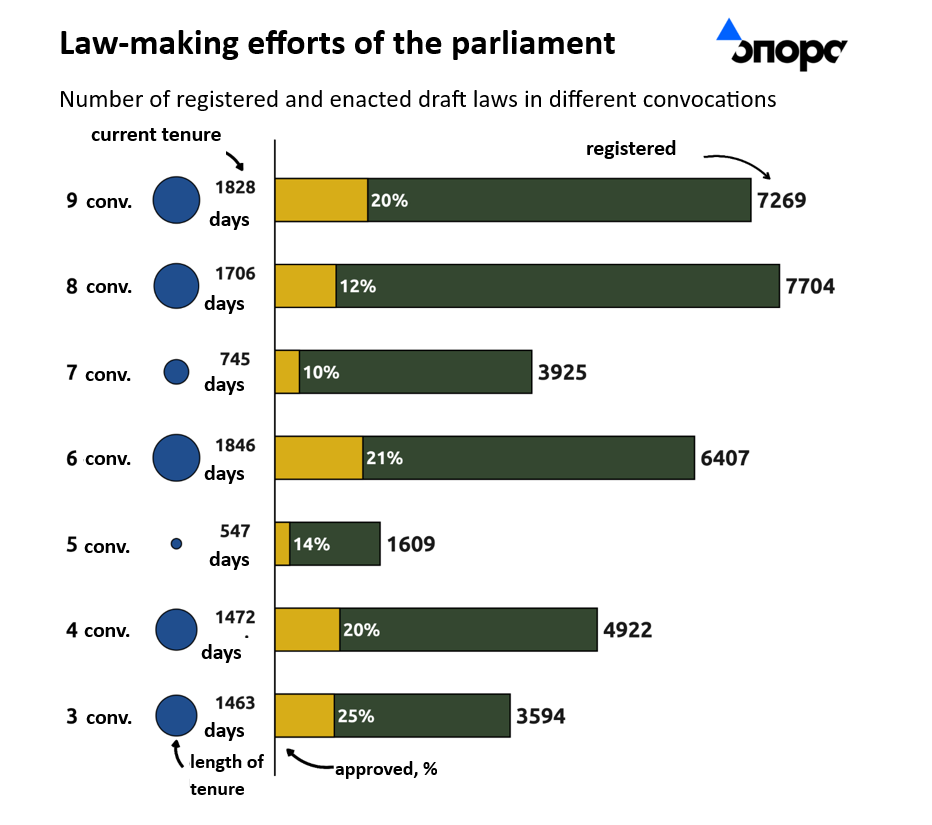
"Turbo mode" after the full-scale invasion
The full-scale Russian invasion has significantly intensified the legislative activity of the parliament. The biggest number of bills was adopted in 2022 – 387.
The real legislative "turbo mode" was in effect in July 2022, when the Parliament passed as many as 65 bills. The second most productive month was December 2019, when 52 bills were passed. This is only one more than in March 2022, at the beginning of the full-scale Russian invasion, and in December 2020.
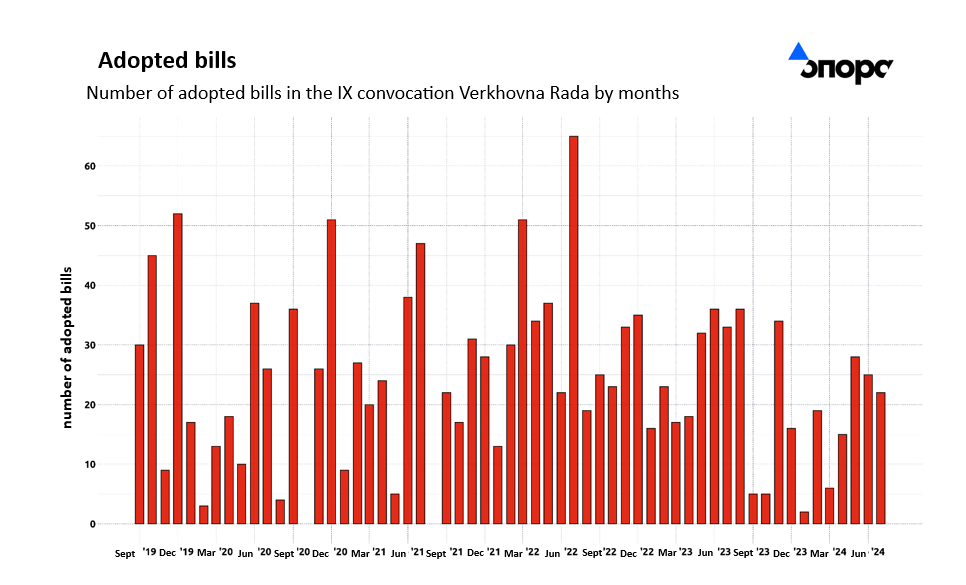
"Security and defense" was almost non-existent before February 24
In addition to the active adoption of bills, during the full-scale Russian invasion, changes in the topics of registered and adopted bills can be noted. The classic leading titles have not changed: economic and legal policy, as well as sectoral development.
The number of registered and adopted initiatives in the field of security and defense has quite naturally increased. While until February 24, 2022, this topic was the last in terms of the number of submitted bills (only 2.8%), now it is addressed in every tenth registered draft law. Previously, only one in 22 adopted draft laws (4.5%) dealt with security and defense, and now it is one out of nine initiatives (11%).
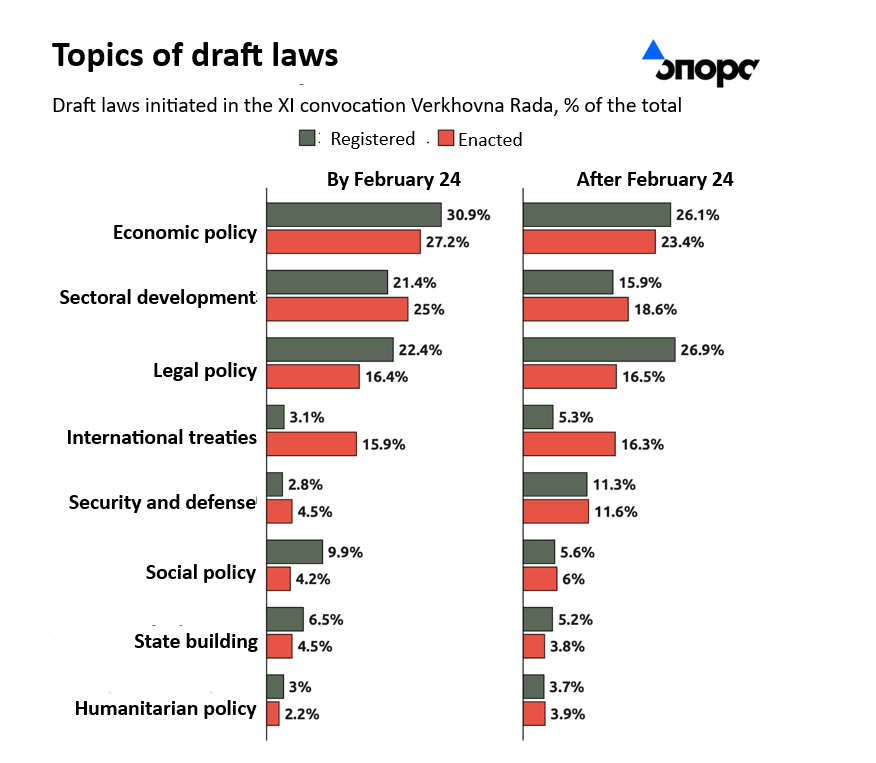
Hundreds of bills are being initiated
The main task of MPs is to develop legislation, not, for example, to repair roads or install playgrounds. Many parliament members take this function quite literally and register hundreds of bills, either on their own or in co-authorship. On the one hand, this is a way for MPs to fulfill their election programs or promises, but on the other hand, the vast majority of such draft laws will never be adopted or even considered by a relevant committee. Often (though perhaps not quite correctly), such activity of MPs is called "legislative spam".
In total, over 5 years, Heorhii Mazurashu of the Servant of the People faction contributed to the development of the largest number of draft laws – 767. The second place goes to another MP from this faction, Pavlo Frolov, who contributed to 503 draft laws.
Andrii Klochko (Servant of the People) co-authored 493 bills, Yevheniia Kravchuk (Servant of the People) – 460, Oleksandr Bakumov – 435 (Servant of the People), Halyna Tretiakova (Servant of the People) – 432, and Serhii Minko (Dovira [Trust] group) – 424.
This is followed by Serhii Shvets (Servant of the People) – 402, Oleh Bondarenko (Servant of the People) – 397, Oleksandr Horobets (Servant of the People) – 394, Mariana Bezuhla (unaffiliated) – 391, Danylo Hetmantsev (Servant of the People) – 390, Yurii Kamelchuk (Servant of the People) – 380, Oleksandr Aliksiichuk (Servant of the People) – 353, and Hennadii Vatsak (Dovira group) – 352.
As we can see, MPs from the largest parliamentary faction, the Servant of the People, were the most active in registering bills. Their initiatives, quite naturally, most often gained support in the Verkhovna Rada: MPs from this faction contributed to more than 91% of the adopted deputy initiatives. In other words, it is the bills of the Servant of the People that determine the current policy of the deputy corps.
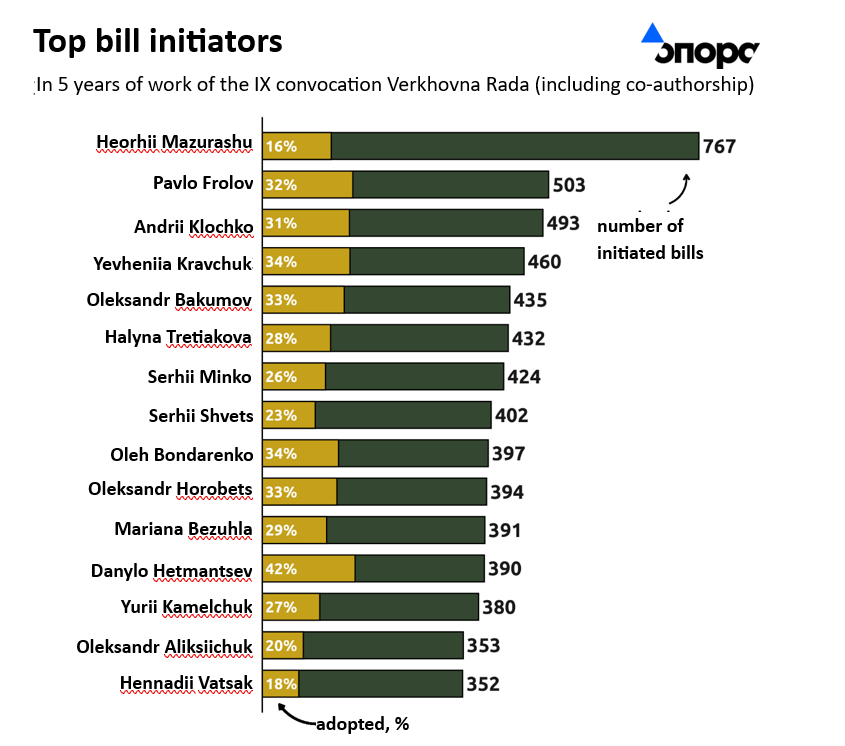
What buttons do MPs press?
In total, over the 5 years of work in the session hall, MPs voted almost 18 thousand times. This means that there were more than 7.5 million clicks on the Rada system buttons in total.
Most often, MPs press the "for" button (41.9% of instances). The second most popular is the "abstain" button. It was used in 23.6% of cases. MPs were absent in 17.6% of cases, and did not vote despite being present in the session hall in 14.6% of cases. MPs pressed the "against" button the least – only in 2.3% of cases. It should be noted that over the last 2 years of work, the already low "against" rate has decreased by another 0.5%. And after February 24, 2022, the "no" vote dropped to the level of a statistical error of 0.4%.
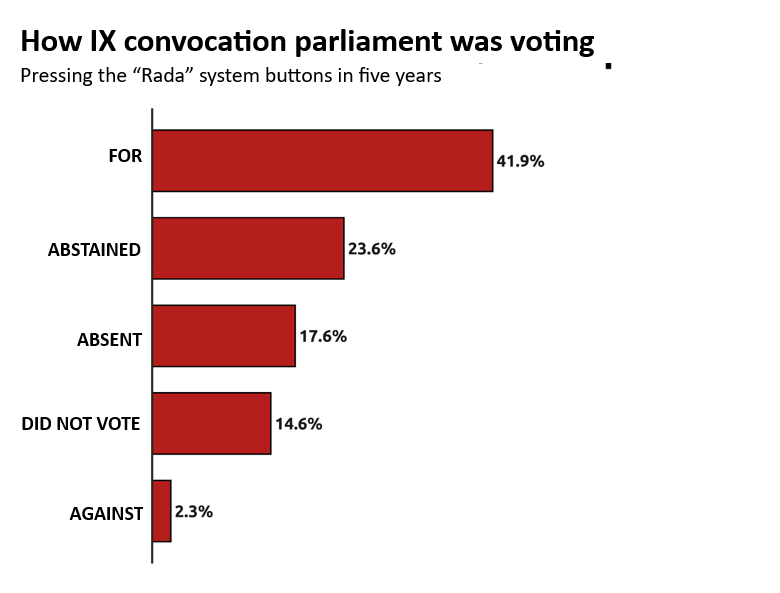
Voting of factions
Over the 5 years of the parliament's work, members of the Dovira (Trust) group have been the most active in voting "for"– 50% of instances, and members of the Servant of the People party – 47%. Members of the Holos (Voice) party are the least likely to press the "yes" button – 29%, and non-factional members – 27% respectively.
The highest rate of "no" votes was recorded for Holos (Voice) and the Platform for Life and Peace group, at the level of 3.5%.
Also, in almost a third of cases, MPs from the European Solidarity party have been abstaining from voting.
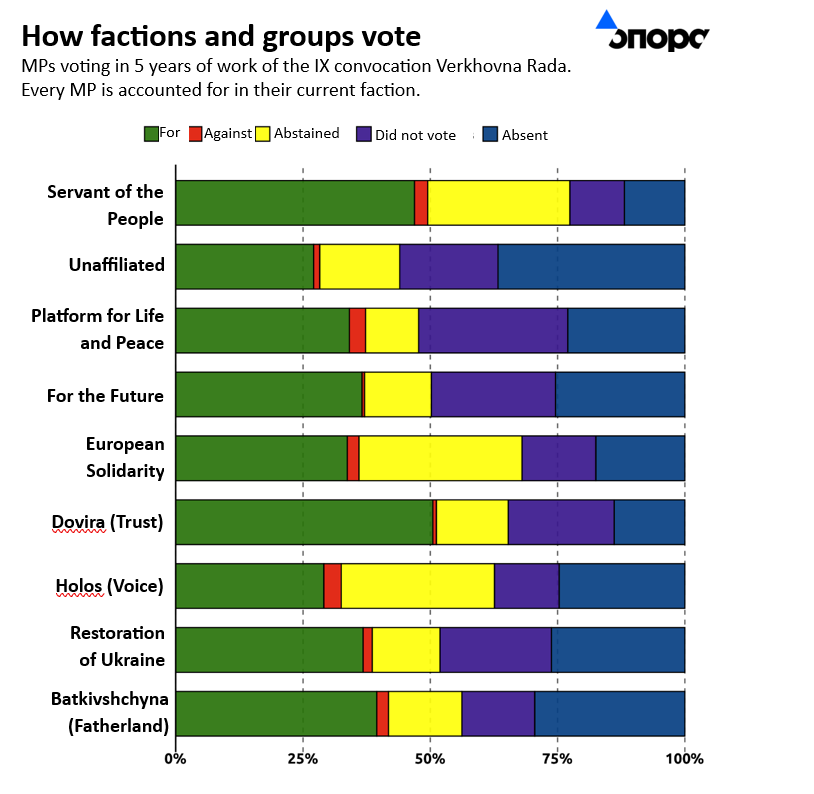
In our previous report, we also analyzed the voting patterns of the groups Restoration of Ukraine and Platform for Life and Peace, which were formed after the banning of the Opposition Platform – For Life party and the dissolution of the respective faction in the Verkhovna Rada. Voting of MPs from these groups sometimes really helps the parliament to gain the necessary votes in favor in the session hall. Without ex-members of the OPFL, some laws would not have been possible to pass at all.
Absentee MPs
MPs from the Servant of the People party are the most disciplined, having missed 23% of voting sessions. Most often the sessions are skipped by non-factional MPs – in 56% of cases.
The leaders in terms of the number of missed voting sessions are Stepan Ivakhiv (For the Future group) and Vadym Stolar (currently – the Restoration of Ukraine group), who did not vote and/or were absent in 97% and 95% of cases respectively. The third and fourth places are occupied by Oleksandr Dubinskyi, a non-factional member of the party, and Ihor Palytsia, a member of the For the Future group, who had 93% of absences. Fedir Khrystenko (unaffiliated) rounds out the top five anti-leaders in terms of attendance.
Among the most undisciplined MPs were Oleksandr Feldman, Serhii Liovochkin, Anzhelika Labunska, Andrii Kozhemiakin, Petro Poroshenko, Oleksandr Hereha, Oles Dovhyi, and Ihor Kisilov.
It is worth noting that a number of the most undisciplined MPs have terminated their powers for various reasons as of August 2024. Among them are Vadym Rabinovych, Andrii Derkach, Ihor Abramovych, Taras Kozak, Dmytro Shentsev, Yuliia Liovochkina, Yurii Solod etc.
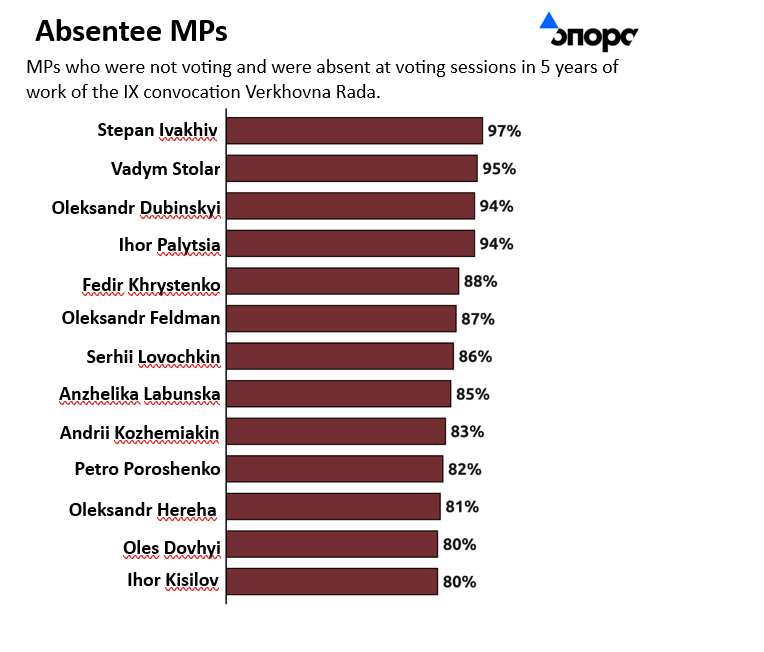
Prior to the full-scale invasion, parliamentary discipline was at around 72% of meetings attended, but after February 24, 2022, it dropped by 10% to around 60%. MPs showed the most responsible attitude in January – 81% and April 2020 – 80%. However, since January 2023, there were 9 months when attendance level was less than 60%.
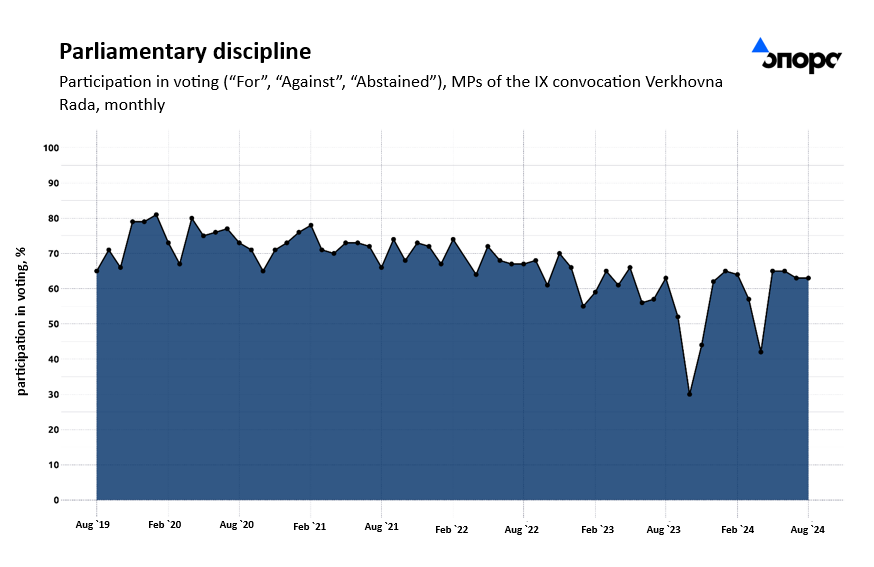
We would like to remind you that, in accordance with the amendments to the legislation adopted in October 2019, attendance at plenary sessions is measured by participation in voting. This means if a deputy does not vote, he or she is not considered present at a meeting. Those MPs who missed more than 30% of the votes are not reimbursed for expenses related to the performance of their authorities as deputies for a respective calendar month.
Speeches of MPs
Over the past five years, 422 MPs have taken the floor in the Parliament. Representatives of opposition parties continue to be among the leaders in terms of the number of speeches. They mostly use the rostrum to express their point of view, suggestions or disagreements on issues under parliament’s consideration, and criticize the actions of the government. The situation was similar before the start of the full-scale war.
In total, there were more than 37 thousand speeches in the Parliament. Nestor Shufrych (Platform for Life and Peace) spoke the most (excluding the parliamentary leadership) – 995 times.
As for the duration of expressing one's opinion, the leader in this indicator is Oleksii Honcharenko (European Solidarity) – 25 hours and 25 minutes. The second place was taken by the leader of the Batkivshchyna (Fatherland) party, Yulia Tymoshenko, with 23 hours and 38 minutes. Nina Yuzhanina, a member of the European Solidarity party, came in third with 22 hours and 40 minutes.
The fourth position is occupied by the aforementioned Nestor Shufrych, whose speeches lasted 20 hours and 18 minutes. Iryna Herashchenko rounds out the top five with 19 hours and 42 minutes.
